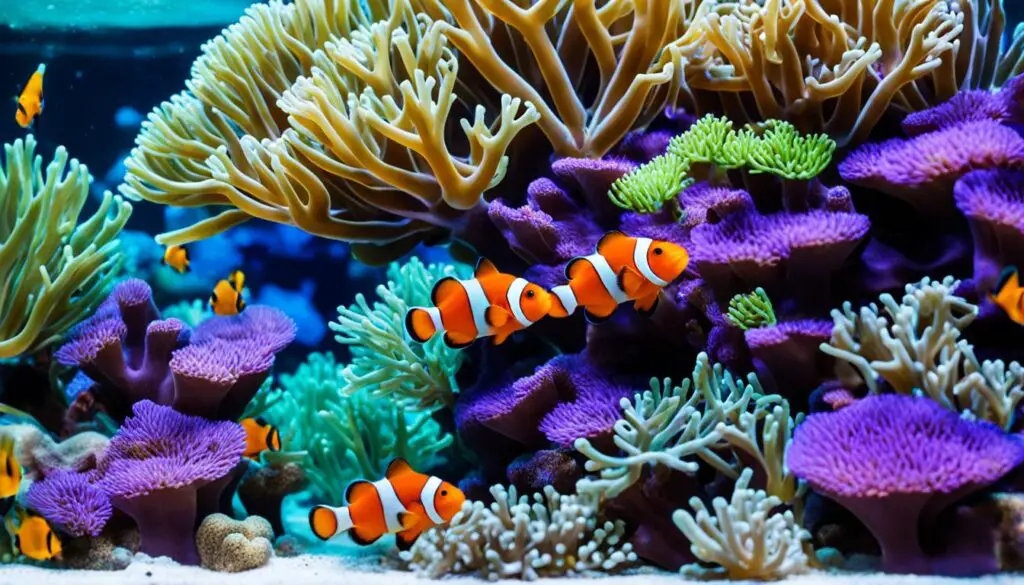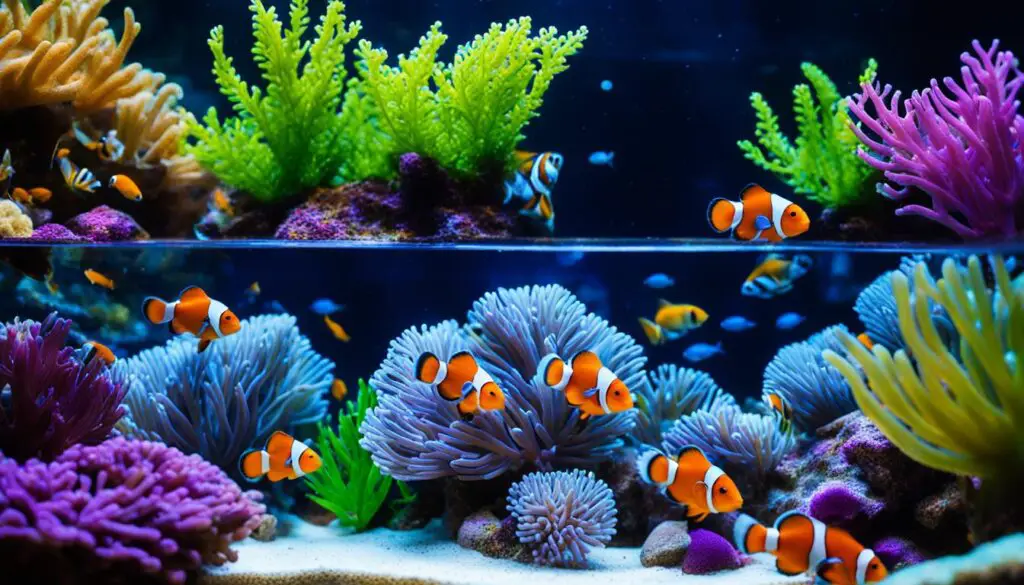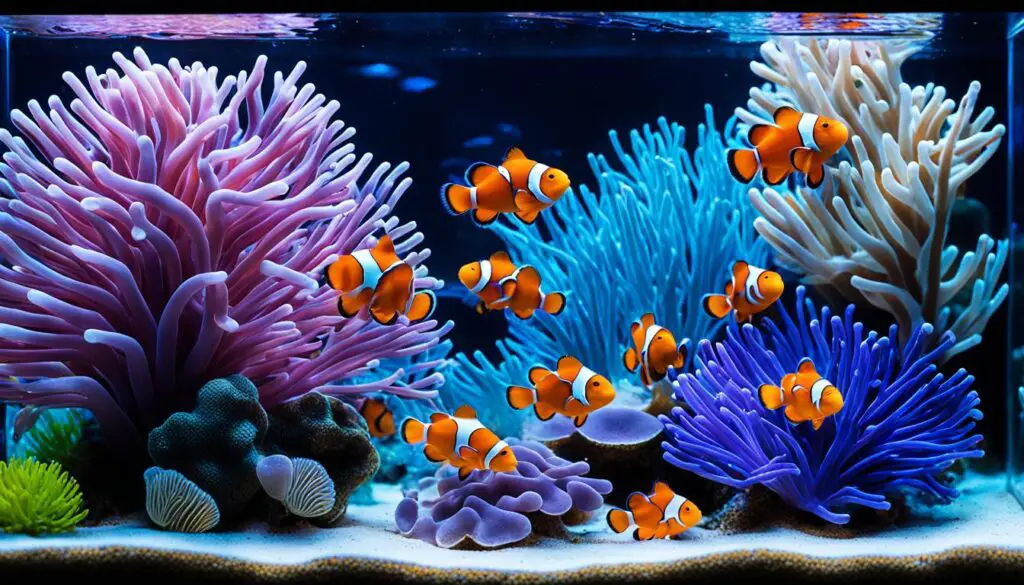Clownfish Tank Health: Keeping Your Fish Happy and Healthy
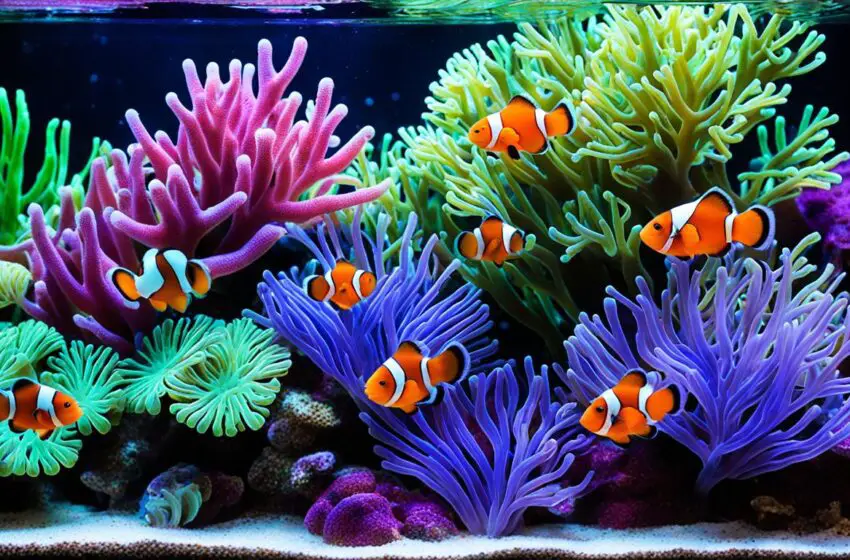
Welcome to the amazing world of clownfish! These lively saltwater fish are well-known for their close link with sea anemones. They come in many species and colors, like Ocellaris, Percula, Tomato, and more. Adding them to your aquarium brings color and life.
Keeping clownfish happy means creating the right environment for them. They are known to be territorial, much like damselfish. So, if you plan on having more than one, you need to choose carefully. Also, in the right conditions, they can even lay eggs in your aquarium.
When setting up your tank for clownfish, make sure to mind these key points:
- Tank Size: Clownfish need at least a 29-gallon tank to move around and claim their space.
- Water Parameters: Keep the water specific gravity between 1.020 and 1.025, with a temperature of 74 to 80 F. This mimics their natural habitat and keeps them healthy.
- Diet: They eat both dry and frozen food. It’s important to give them a balanced meal to stay in good shape.
To make a great home for clownfish, you’ll need certain items. This includes the right sized tank, conditioner for the water, a filter, and more. Each of these plays a part in making sure your fish are happy and well.
Key Takeaways:
- Clownfish love their space and need room to themselves.
- They can have babies in the right conditions.
- A tank that’s at least 29 gallons is best for them.
- Keep the water between a specific gravity of 1.020 and 1.025.
- Their diet should be a mix of dry and frozen foods.
Choosing the Right Enclosure for Clownfish
It’s vital to pick the correct home for your clownfish to keep them healthy and happy. A tank for one adult should be at least 29 gallons, but bigger is better. This allows more space for the fish to move and establish territories.
Keep clownfish tanks out of direct sunlight, near windows, and away from air conditioners. This helps avoid sudden changes in water properties. Certain clownfish types need to live alone or with their mate. Some also enjoy the company of sea anemones.
Clownfish get along with many other fish types like dwarf and large angelfish, blennies, etc. Yet, some clownfish can get very territorial and aggressive towards others of their kind.
It’s crucial to add new fish slowly and not overcrowd the tank to reduce stress and disease. A good filter is a must to keep the water clean. A flow of water four times the tank’s volume per hour is best for clownfish, who like gentle to moderate water movement.
You need to test the water regularly and add marine salt to keep the water healthy. Installing a heater will also help keep the water at the right temperature. Decorate the tank with hiding spots, caves, and rocks to make it look like the clownfish’s natural environment.
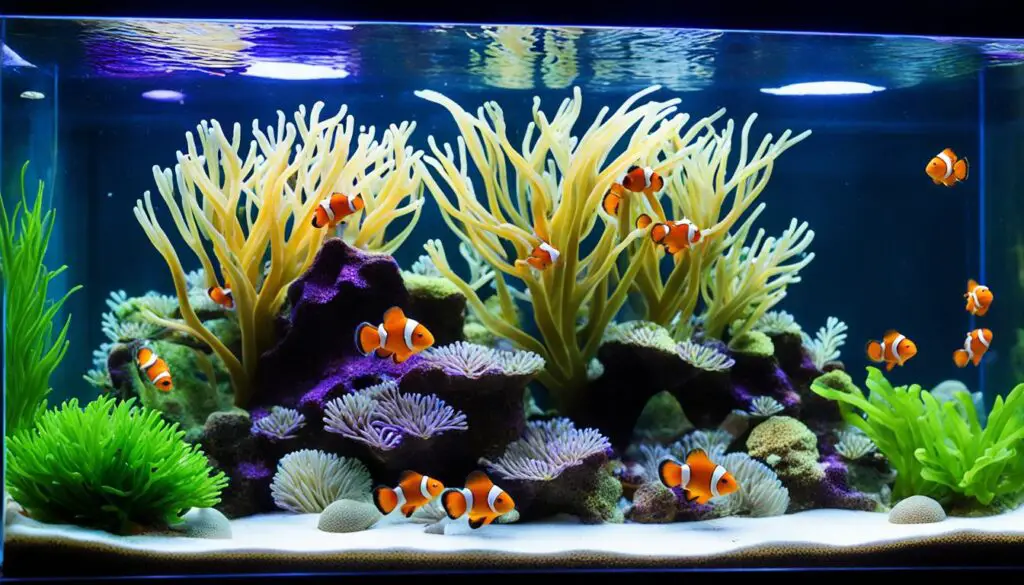
Compatible Tankmates for Clownfish
When choosing friends for your clownfish, pick species known to live well with others. Here are some good choices that can share a tank with clownfish:
| Fish Species | General Characteristics |
|---|---|
| Dwarf Angelfish | Peaceful, colorful fish that adds variety to the tank |
| Blennies | Small, interesting fish known for their unique behaviors |
| Gobies | Bottom-dwelling fish that help clean the tank |
| Hawkfish | Active fish with vibrant colors and interesting perching behaviors |
| Pseudochromis | Aggressive fish that can coexist with clownfish if tank size is adequate |
| Puffers | Unique fish known for their ability to inflate when threatened |
| Tangs | Active herbivorous fish that add movement and color to the tank |
Always do your homework on any new fish to make sure they will get along. This helps create a happy home for all the fish in your tank.
Do Clownfish Need Anemones?
Clownfish are often linked with anemones, but they don’t actually need them to thrive. Anemones offer protection and a place for fish to live. However, clownfish can make homes in various places.
This includes coral, nooks, caves, and even man-made items like algae scrapers. Some clownfish may choose certain anemones to live in. Yet, they might happily live elsewhere, like with mushrooms or specific corals.
Not all clownfish will find anemones appealing. Also, these sea creatures can pose risks by moving and stinging others. If you want anemones, keeping them on small rock islands can help keep them in place.
In a 30-gallon tank, peaceful fish like gold cleaner gobies or purple firefish are good choices. Chromis and various firefish species also do well.
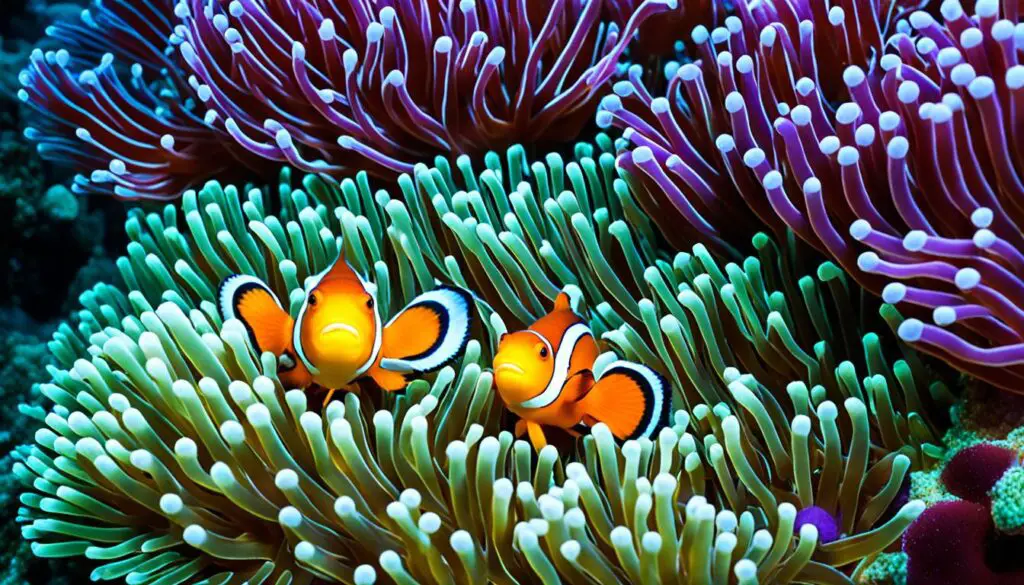
| Benefits of Clownfish Hosting | Alternatives to Anemone Hosting |
|---|---|
| Provides a sense of protection | Coral |
| Serves as a natural host | Crevices |
| Enhances the overall tank aesthetics | Caves |
| Allows for interesting behavioral displays | Magnetic algae scrapers or return nozzles |
| Potential risks to other tank occupants | Invertebrates like mushrooms or LPS corals |
Conclusion
To keep your clownfish tank fry healthy and happy, pay close attention to their care. Choose the right tank size and the best tankmates for a peaceful environment. Keeping the water clean and at the right temperature is crucial. Also, make sure to feed them a varied diet for their best health.
Though many think clownfish need anemones, they can thrive without them. Clownfish may even host in other safe objects in the tank.
Create a welcoming tank with the right steps. Doing this will let your clownfish show off their bright colors and playful behavior. Always care for their needs and keep the tank balanced. This will help you enjoy them for years as they thrive in their home.
Caring for your clownfish fry is a rewarding experience. It adds beauty and life to your tank.
FAQ
How big of a tank do clownfish need?
Clownfish need at least a 29-gallon tank. Bigger tanks are better. They need space to hide and claim areas. This makes them feel safe.
Can clownfish live with other fish?
Clownfish get along with many other fish. They are friends with dwarf and large angelfish. They also like being with blennies, gobies, and more.
Do clownfish need anemones to be happy and healthy?
Clownfish are not a must for clownfish. They can live near coral, in hidden places, or with certain kind of invertebrates. Such places make them feel at home.
What are some alternatives to anemone hosting for clownfish?
Clownfish feel at home with mushrooms or certain corals too. Some types may like anemones but can live without if needed.
How can I ensure the health of clownfish tank fry?
Keep the clownfish fry in a big enough tank. Add fish that get along and keep the water clean. It’s also important to feed them well.

